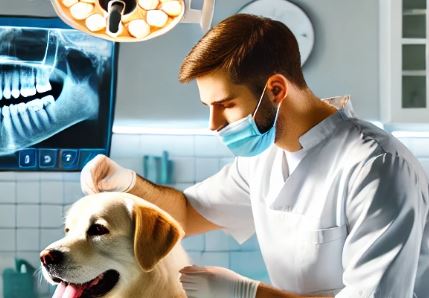I'm a participant in the Amazon Services LLC Associates Program, an affiliate advertising program designed to provide a means for me to earn fees by linking to Amazon.com and affiliated sites.
Maintaining your dog’s dental health is crucial for their overall well-being. Regular dental cleanings can prevent serious health issues and ensure your pet leads a happy, healthy life. But how often should dog dental cleaning be scheduled? This article delves into the frequency of professional cleanings, the role of dental treats in reducing the need for frequent visits, and tips for maintaining your dog’s oral hygiene at home.
Much like how brushing your teeth between dental visits is obviously recommended for optimal dental health, giving your dog dental chews is a good way to enhance your pet’s dental health. Need help finding the right treat? Our guide on the Best Dental Treats for Dogs can show you which ones to get.
Key Takeaways
- Regular dental cleanings are essential for your dog’s health.
- Dental treats can help reduce the frequency of professional cleanings.
- Maintaining a consistent dental care routine at home is crucial.
Importance of Regular Dental Cleanings
Professional dental cleanings are vital for removing plaque and tartar that home care routines might miss. They help prevent periodontal disease, which can lead to tooth loss and other serious health issues such as heart, liver, and kidney problems. Most veterinarians recommend a dental cleaning at least once a year, but the frequency can vary depending on your dog’s breed, age, and overall health.
Factors Influencing Cleaning Frequency
- Breed: Some breeds are more prone to dental issues due to the structure of their mouths. For example, small breeds like Chihuahuas and toy poodles may require more frequent cleanings.
- Age: Older dogs often need more frequent dental care as their teeth and gums become more susceptible to disease.
- Diet and Chewing Habits: Dogs that eat a dry kibble diet and regularly chew on toys or dental treats tend to have less plaque buildup than those who eat wet food or soft treats exclusively.
Benefits of Dental Treats
Incorporating dental treats into your dog’s routine can significantly reduce the frequency of professional cleanings. Dental treats are designed to clean teeth and freshen breath as your dog chews. They help scrape away plaque and tartar, making them an effective addition to regular brushing and professional cleanings.
How Dental Treats Work
Dental treats work through a combination of mechanical action and active ingredients. The chewing action helps remove plaque, while ingredients like chlorhexidine or enzymes can help reduce bacterial growth in the mouth. Regular use of dental treats can help maintain your dog’s oral health between professional cleanings.
Recent Developments in Dog Dental Care
As of July 8, 2024, advancements in dog dental care have focused on improving the effectiveness and safety of dental products. New formulations of dental treats include natural ingredients like coconut oil and turmeric, known for their anti-inflammatory and antibacterial properties. Additionally, innovations in dental chew toys have made them more effective at reaching and cleaning different areas of the mouth.
Top Experts and Entities in Dog Dental Care
American Veterinary Medical Association (AVMA)
The AVMA provides guidelines and resources for pet dental care, emphasizing the importance of regular check-ups and cleanings.
Veterinary Oral Health Council (VOHC)
The VOHC endorses dental products that meet rigorous standards for reducing plaque and tartar. Their Seal of Acceptance is a reliable indicator of a product’s effectiveness.
Dr. Brook Niemiec
Dr. Brook Niemiec, a board-certified veterinary dentist, is known for his expertise in pet dental health. He advocates for a comprehensive approach to dental care, including regular cleanings, at-home care, and the use of effective dental treats.
Internal Links
- Water Fountain Bowl: Guide for Pet Owners
- Best Battery Operated Cat Water Fountain 2024
- Greenies vs Whimzees: Expert Dental Treat Review
- Greenies vs Dentastix: Expert Dental Chew Showdown
- Best Dog Cooling Mat
Conclusion
Regular dental cleanings are essential for maintaining your dog’s health. While the frequency of cleanings can vary, incorporating dental treats and maintaining a consistent at-home dental care routine can significantly reduce the need for frequent professional cleanings. By staying informed and proactive about your dog’s dental health, you can ensure they lead a happy and healthy life.
Author: PetsPal
PetsPal is an expert in the field of pet care with many years of experience, dedicated to providing valuable information and advice to pet owners. Learn more about PetsPal.
FAQs – How Often Should You Schedule Dog Dental Cleaning?
Q: How often should I schedule dental cleanings for my dog? A: Most veterinarians recommend at least once a year, but this can vary based on your dog’s breed, age, and health.
Q: Can dental treats replace professional cleanings? A: Dental treats are a helpful addition but should not replace professional cleanings. They can reduce the frequency of cleanings by maintaining oral health between visits.
Q: What are the signs that my dog needs a dental cleaning? A: Bad breath, yellow or brown teeth, excessive drooling, and difficulty eating are common signs that your dog may need a dental cleaning.
Q: Are there risks associated with professional dental cleanings for dogs? A: While generally safe, professional cleanings do involve anesthesia, which carries some risk. It’s important to discuss any concerns with your veterinarian.
Q: How can I maintain my dog’s dental health at home? A: Regular brushing, providing dental treats, and ensuring your dog has chew toys can help maintain their dental health.
